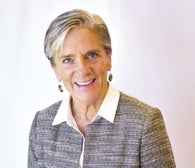When caregiving affects work
 Kristine Bostek
Kristine Bostek
What does this seem like to you? A receptionist who is 30 minutes late every day. A sales rep who struggles to stay awake during regular team meetings. A project manager who has missed three deadlines and failed to fill in her timesheets two weeks in a row.
Do they seem like problem employees? Actually, they could be great employees doing their best to fulfill their responsibilities at work because they are simultaneously dealing with the noble, unpredictable and often overwhelming round-the-clock challenge of caring for an older adult.
They are not alone. An estimated 650,600 Massachusetts residents provide care to enable their spouses, parents, grandparents and other loved ones to continue living safely in their homes. Balancing a job with family caregiving responsibilities can be particularly difficult. Caregivers often have higher rates of absenteeism, make more requests to leave early or come in late, and are more likely to cut back on hours, retire early or quit. They're also at higher risk for depression, diabetes, high cholesterol, hypertension, COPD, heart disease, kidney disease and stress. Any of these can have an impact on productivity, as well as a business' healthcare costs.
Your company can help by being a resource for employees with caregiver responsibilities.
Let them know about coordinated care programs that improve the quality of seniors' lives while reducing the strain on families. These government programs – called the Medicare Advantage Special Needs Plan (SNP) & Senior Care Options (SCO) as well as the Program of All-Inclusive Care for the Elderly (PACE) – provide benefits that exceed what is offered traditionally through Medicare and Medicaid and can make a significant difference for caregivers and their loved ones alike.
Fallon's NaviCare (SNP and SCO) and Summit ElderCare (PACE) programs offer the covered Medicare and Medicaid benefits plus:
• Personalized medical care plan with a dedicated team
• Coordinated care with a centralized medical record
• Transportation to and from medical appointments
• Rides to social activities like family events and church
• Assistance with bathing, dressing and home meal preparation
• Adult day health program providing recreation and socialization
These are just some of the additional benefits that have the potential to relieve some of the stress on caregivers.
The principles behind these programs are the same: keep seniors healthy and living as independently as possible in the community and share the care with caregivers. This provides tremendous peace of mind, so caregivers don't neglect their health, work and family responsibilities.
It continues to surprise me that these plans are not more broadly known and therefore underutilized. Only one-in-three eligible Massachusetts residents is taking advantage of a SCO, SNP or PACE plan. We can begin to change this by creating awareness among employees, caregivers and medical providers.
November is National Family Caregivers Month. Let's remember to recognize all loving caregivers – in our communities and workplaces – and raise awareness of the programs that provide them and their loved ones with the support they need.
Kristine Bostek is vice president for senior care services at Fallon Health in Worcester.













0 Comments